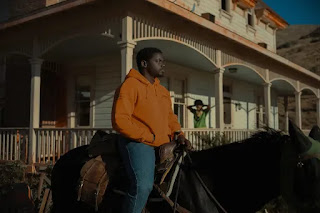Director Jordan Peele’s third movie, Nope, should spark heated discussions among Peele’s legion of fans. Some will find the movie daring and provocative. Others may experience more consternation than they'd like. Still others will see the movie as a highly variable exploration of multiple ideas that proceeds without offering enough by way of thematic punch.
I find myself in the latter group.
It’s difficult to write about Nope without spoilers, so I’ll offer only a sketchy plot summary.
A rancher (Daniel Kaluuya) trains horses and works as a handler of those horses on movie sets. Kaluuya's OJ is joined on his failing ranch by his sister Emerald (Keke Palmer), a lively young woman whose personality contrasts with the cowboy stoicism OJ struggles to maintain.
The major development: A UFO — often barely visible — hovers above OJ's ranch, causing fluctuations in power and wreaking more dangerous forms of havoc.
With visions of fame and fortune dancing in their heads, OJ and Emerald visit a local electronics store and arrange for a techie (Brandon Perea) to install cameras at their ranch. They want to capture this amazing alien arrival and enrich themselves in the bargain.
They're looking for what they call "the Oprah shot," exposure on a validating scale.
The alien visitor isn’t looking to make friends. Like a vacuum, the ship (it looks like a flying white pancake) sucks up objects, livestock, and people, most of them from a nearby attraction, a ranch-like theme park run by Ricky "Jupe" Park (Steven Yeun). As a kid, the grandiose Park was part of a sitcom built around a chimpanzee named Gordy. More on that sitcom within the movie later.
Peele, whose movies always invite a plunge beneath the surface, seems to have many things on his mind: a look at the way artificial effects are squeezing the life out of movies, a mildly parodic take on classic sic-fi, a sustained serving of dread, and a variety of other possibilities that audiences can uncover for themselves.
For me, the problem with Nope isn’t that it’s weird. It may not be weird enough. Peele puts a toe in Lynchian waters but doesn’t dive headlong into the pool.
Instead, Nope becomes a movie of hints and suggestions. Early on, Peele deals with the way Blacks played a pivotal but unacknowledged role in creating the movies.
Edweard Muybridge, a 19th Century English photographer, is credited with having made the first moving picture, a man on a galloping horse. Nope tells us the rider was Black, one of OJ and Emerald's ancestors.
Now, the specialty business built by OJ's father (a briefly seen Keith David) is being supplanted by computer-generated horses that never bolt.
Perhaps we're meant to conclude that movies aren't evolving; they're betraying their origins.
That idea -- the uncontainable often brutal nature of life -- echoes through a vividly presented episode from Park's sitcom day, an episode that’s dropped into the movie like a footnote.
I wouldn’t call Nope an actors’ movie. Kaluuya keeps things closes to the vest; Palmer juices the proceedings with verve; and Perea makes a credible techie who’s gradually pushed beyond his skill set.
Michael Wincott shows up late in the movie as an assertive cinematographer whom OJ — it stands for Otis Jr. — invites to film the UFO. OJ hopes that professional footage, as opposed to the original idea of using surveillance cameras, will enable him to save the ranch and taste some glory.
There’s nothing wrong with a film that wants to play around with different ideas and tropes. But unlike Peele’s other two movies (Get Out and Us), Nope too often seems stuck in a creepy groove as Peele dishes out grinding sounds from the alien ship and numerous visual jokes, at least one of them qualifying as zany and inspired. Consider it a whopping goof on every spectacular sci-fi ending.
Looking back on it, I wondered whether Nope wasn't its best when it was being playful, light on its feet and even silly.
Given the expectations for Nope, I’d call the movie a letdown. Nope made me long for the moment when the film would find itself, and I, in turn, would find it.
For me, though, the movie's pleasures -- and there were some -- arrived only in piecemeal fashion.

No comments:
Post a Comment